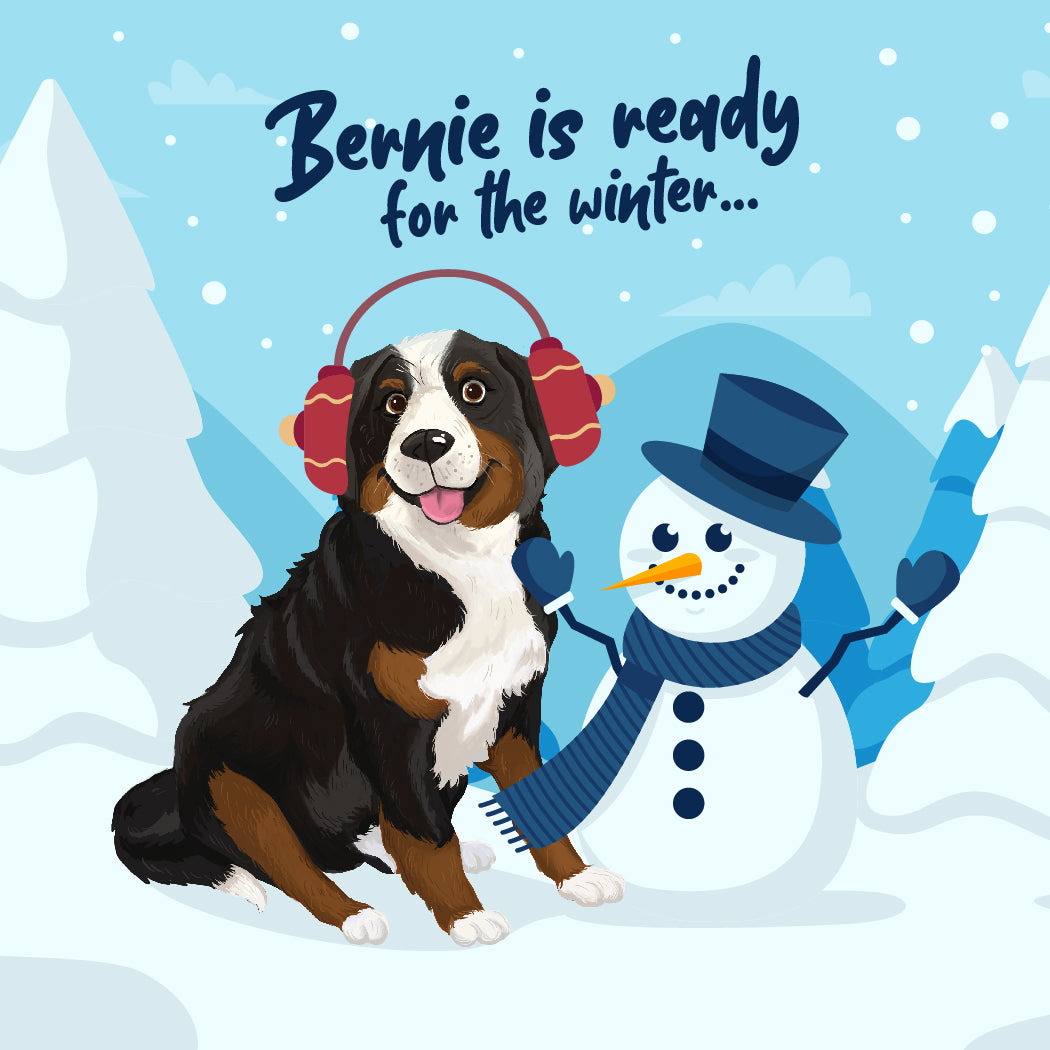The cooler temps are fast upon us, and just like in humans, winter weather can take its toll on our dog’s skin. While many of our four-legged friends love playing in the brisk air, that same air can leave your dog feeling chilled to the bone, dry, itchy and sore. More, if your dog’s skin and coat are not healthy, it’s a good sign that they may need some help in the nutrition department too, and you’ll want to be sure you address that so they stay comfy cozy through the next several months.
Why is winter weather worse for your dog?
Even for dogs like Bernie, who live for cooler temps and mountain-like conditions (he IS a Bernese Mountain Dog, after all!), we still need to make sure our best friends have some attention paid to their skins and coats too.
Winter months bring in much lower humidity (for the most part—sorry, Florida), and that lower humidity means that the air is dry. Dry air often means dry skin, as the moisture is lower, and dry skin is itchy. Your dog may love the cooler temps, but his skin misses the moisture that spring and summer’s humidity brought.
Not to mention, winter weather simply brings in colder air. The colder air is often accompanied by wind chills that make your paws curl, and as doggies need to do their doodies, they’re constantly in and out, in and out of that cold, often blustery air. It can be hard for their skin and coats to continually regulate, and so giving them some extra love during the winter months can mean they have healthier skins and coats.
Spa time is not just for summer
Colder, wintry weather means you’ll probably need to adjust your grooming schedule and routine. Your dog will probably love the fewer baths you’ll want to give because believe it or not, more frequent bathing actually can dry their skin out more. That dry skin can be itchy, and dogs can’t help but scratch and itch. Limiting baths will help their body’s natural oils moisturize their skin and keep them less prone to constant scratching.
Using a soft brush on your dog’s coat regularly will also help stimulate their skin’s natural oil glands and hair follicles, and it’ll also remove any patches of dry and dead skin cells so their body can properly regenerate.
You’ll also want to make sure that when you DO give them baths, the shampoo you use is a moisturizing one that isn’t full of toxic chemicals. Remember that the skin is your dog’s largest organ (ours too!) and whatever you put on their skin goes directly into their body’s system. When bathing, consider basic water baths to just get the necessary mud/snow/dirt off, and when you do need to shampoo, be sure it’s a quality moisturizing shampoo that will nourish and feed their skin.
Also, consider using a humidifier near your dog’s bed when they’re sleeping. This isn’t a terrible idea for humans, either, as moist air helps keep our bodies’ upper-respiratory passages healthy. Our noses are the number one place that cilia (tiny hairs inside) protect us from viruses and infection, and when they’re dry and our cilia are hard, it can’t prevent viruses or infection from invading our body. While our dog’s noses don’t work quite the same way, a humidifier will help moisturize the air your dog breathes, and this keeps their little noses nice and wet all winter long. It will also help keep dry, itchy skin at bay, and that means fewer cracks in their skin and their paws.
Remember the temperature
Sure many dog breeds LIVE for winter weather. Dogs like Bernie and Lady were meant to be able to withstand cooler temperatures and even relish in them. But even they have their limits, and it’s important that even though your dog may have thick fur and love the winter and snow, you monitor how often they’re out in the extremes.

Yes, they need exercise and walks, but that may also mean that some dogs may need shorter periods of walking or exercising more often, and they may need to wear coats to keep their body temperatures regulated.
It’s never a good idea to leave your dog out in the cold weather for extended periods of time, even if it seems like he loves it. He may, but his skin and coat? Not so much.
We are what we eat
It’s true, and that especially goes for the winter months when we’re enjoying all those yummy holiday treats and not feeling particularly motivated to work those extra calories off. The most important thing you can do to keep your dog’s skin and coat healthy all year long is to make sure they’re getting the proper nourishment.
When your dog’s gut health is in good shape, that good health radiates from the inside out. The number one reason your dog may have poor skin and coat conditions any time of the year is that they’re not getting the proper nutrition, and during winter months? They’re especially vulnerable.
Bernie’s Perfect Poop is the supplement you’ll want to help ward off any poor skin and coat conditions. With the perfect combination of fiber, prebiotics, probiotics and enzymes, your dog will have good dog gut health. Good dog gut health is the key to healthier, happier skins and coats, and you can be sure they’ll be free of itchy skin and irritation all winter long. They’ll also have shiny and lustrous coats, and let’s face it—if we have to put our winter faces on and face the dreary cold, don’t we want to do it looking and feeling our best?


